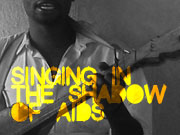 |
| Passionate, sweaty rhymes fill a tiny recording studio in Tanzania. (Photo: Jonah Eller-Isaacs) |
Arusha, Tanzania — The nation of Tanzania dwarfs Malawi, its southern neighbor. With more than 125 ethnic groups, Tanzania is a country of dramatic extremes, from noisy, crowded cities like the capital of Dar es Salaam to the serene quiet of some of the world's best-known wildlife parks like the Serengeti and the Ngorogoro Crater. Tanzania is also suffering under the burden of AIDS.
"The difficulty is to try to take the enormity of this problem and its impact on society and to summarize it," says Dr. Mark Jacobsen. "One simply cannot get one's arms around the length and breadth of the destructiveness of this disease in the African setting."
Dr. Jacobsen is the head of Selian Lutheran Hospital in Arusha. He's worked in the area for decades, and has seen the impact of the epidemic since the initial discovery of HIV cases in Tanzania.
"The epidemic began slowly," Dr. Jacobsen says. "But now we've gone from 1986 when the first cases were presented, to a point where now it's estimated in Tanzania that somewhere between 12 and 15 percent of the population is infected, and that translates into between two and three million people having the virus."
CULTURE AND PRACTICE
AIDS in Tanzania is worsened by the status of women and girls.
"According to the culture of Tanzania, women are not involved in decision-making," explains Suzan Mallya, a nurse. "Men are the ones who decide what to do, so even if the woman goes with the condom to the man, the man has the right to say, no, I don't need to use condom. And also, according to the culture, issue of sexual intercourse is not a discussion to the woman. It's just the order from the man."
HIV in Tanzania is also exploding because of some long-standing cultural practices. Male and female group circumcision rituals are sometimes performed using the same blade, potentially infecting an entire generation of village adolescents.
And there are other hazardous behaviors, including polygamy.
"Polygamy is common in some groups," says Dr. Ron Eggert, a pediatrician at Selian Hospital's Town Clinic. "If one person introduces HIV into a circle of individuals who are having sexual relations, it isn't long before the whole group is affected."
Dr. Eggert shares a common example.
"One member of the family goes off and takes a job as a trucker between Dar and Nairobi and becomes infected, and then goes back to his village. Soon many people in the village have the infection," Eggert says.
The Maasai are famous for their bright red and blue robes, and a fierce dedication to their pastoral life. They're also recognized for their musical skills. Each generation of young warriors composes its own chants, improvising on subjects that affect the lives of the Maasai.
But the music of Tanzania today is not just traditional. There's a new musical language that helps youth discuss their lives.
HIP HOP AS A FORCE OF CHANGE
Arusha is the commercial center of the northern Tanzanian highlands, and the gateway to natural wonders like Mt. Kilimanjaro. Throughout the streets of this fast-growing city of nearly 100,000, carts and shops blast hip hop from all over the world, and young Tanzanians have fallen in love with it.
American artists like Jay-Z and 2Pac are superstars here. But Tanzanian artists like X Plastaz -- who work with a Maasai vocalist -- dominate the airwaves.
Teenagers are at high risk for HIV transmission. Activists in Tanzania have found a way to reach them, by spreading public health messages through hip hop.
Ishi is the Swahili command to live. It's also the name of a government-sponsored organization that's had huge success promoting its message. Nassoro Ally is a regional outreach coordinator for Ishi, and he explains Ishi's strategy.
"Our main theme -- don't feel shy, talk with your partner about abstinence, being faithful or using a condom," Ally says.
Ishi promotes the prevention method known internationally as ABC -- A for abstinence, B for being faithful, and C for condoms. They've employed the top names in Tanzanian hip hop to bring that message home, and they've done it with remarkable success. Their theme song, "Usione Soo" is a constant presence on music television.
Ishi's message has saturated all available media and reached a huge audience. You can even hear elementary school-aged children singing along with the song's refrain, which contains the Swahili version of the ABC method.
"We have TV ad, we have radio ad, we use magazine, we use billboard," says Ally. "So it reaches a lot of youth who are able to read and write. And for those who are not able to read and write, we reach them through our community concerts. It has a big impact."
Several groups in urban Tanzania are taking the Ishi model of musical health education to heart. The organization Aang Serian, or "House of Peace," promotes indigenous culture by encouraging dialogue between international volunteers and local communities. They've also founded a hip hop studio in the heart of Arusha.
Teens who use the studio are recording an album with songs focused on health issues. Following Ishi's lead, these youth are using their music to deliver messages to each other.
In Tanzania, just as in Malawi, music provides a way for each generation to find its own voice. As both hip hop poets and chanting warriors fall to AIDS, it becomes all the more important for youth to find creative outlets for expression.









